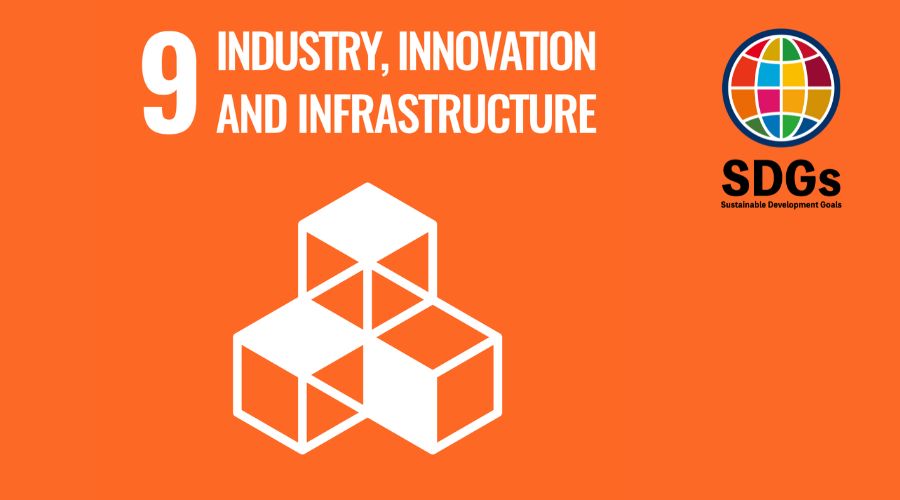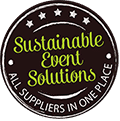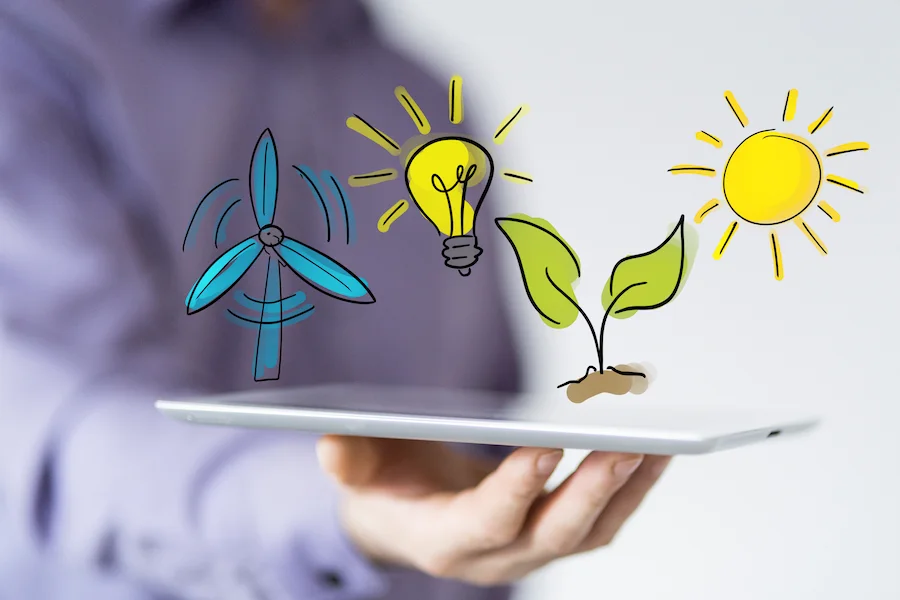What do the Sustainable Development Goals(SDGs) have to do with events? A whole lot! Integrating the SDGs into events is an important step on the road to sustainability. Through conscious event planning and the implementation of sustainable practices, your events can also make an important contribution to solving global problems and become a role model for sustainability at the same time. For this reason, we are presenting "SDG 9 - Industry, Innovation and Infrastructure" to you today.

SDG 9 - Industry, innovation and infrastructure
SDG 9 aims to build resilient infrastructure and ensure access to it, promote inclusive and sustainable industrialization, and support innovation.
This is what SDG 9 means for events
SDG 9 encourages event planners and service providers to use sustainable practices, innovations, and technologies to improve infrastructure, promote sustainable economic growth, and expand and facilitate access to information technologies.
You as an event organizer or service provider can integrate sustainable practices into your events. This could be for example
- the implementation of technology and digital solutions,
- the promotion of sustainable mobility,
- the improvement of energy efficiency
- or the choice of sustainable venues.

Events that lead by example
European Mobility Week
European Mobility Week is an annual campaign to promote sustainable mobility and intelligent transport systems in European cities. During this week, various events such as bicycle campaigns, pedestrian actions, mobility fairs and workshops are organized. In this way, the initiators want to create awareness for sustainable transport alternatives and promote the development of sustainable infrastructures.
Global Off-Grid Solar Forum and Expo
This event focuses on the deployment of solar power in off-grid regions. It brings together industry experts, government representatives, and NGOs to discuss the benefits of solar power for decentralized energy supply. The event aims to improve access to sustainable energy solutions in rural areas and promote the development of renewable infrastructure.
SXSW Eco
The annual conference focuses on sustainability, the environment and green technology. Here, even sustainable practices are implemented by using digital technologies for communication and interaction and encouraging participants to use public transportation. Organizers also focus on environmentally friendly packaging and catering. The conference also provides platforms for sustainable start-ups and innovative solutions.
Impact Festival
The B2B festival's mission is to foster collaborations for sustainable innovation by bringing together GreenTech startups and SMEs, corporate sustainability managers with investors.
World Summit on the Information Society Forum
This annual world summit forum is organized by UN agencies. It aims to provide an opportunity to exchange information, create knowledge and share best practices, identify emerging trends and foster partnerships.
World Manufacturing Forum
This forum brings together decision-makers from the manufacturing industry to discuss the promotion of sustainable production methods and innovative technologies. It aims to strengthen the industry's competitiveness while promoting sustainable practices.
Smart City Expo World Congress
The annual congress in Barcelona focuses on promoting smart cities and innovative infrastructure solutions. It brings together experts, government representatives and companies to exchange ideas and best practices that contribute to sustainable urban development.
These immediate actions at events pay into SDG 9
As an event planner, how can you support SDG 9? For example:
Sustainable event planning
As event professionals, you can incorporate sustainable practices into your event planning. This includes choosing sustainable venues, reducing waste through recycling and composting, using renewable energy sources, and encouraging public transportation for attendees to and from the event.

Choose sustainable venues
As event planners, you can select venues that have sustainable infrastructure and operating practices. This can include the use of renewable energy, environmentally friendly construction methods, water efficiency, waste management, circular economy and barrier-free access.
Improve energy efficiency
By using energy-efficient technologies and practices, you as an event planner can reduce energy consumption during an event. Examples include LED lighting, energy-efficient equipment and smart energy management systems.
Promoting sustainable mobility
As event professionals, they can promote public transportation, carpooling, and bicycle parking for attendees to reduce CO₂ emissions from personal transportation. By supporting sustainable transportation options, they can help improve infrastructure and access. It also has a positive impact if your guests test new technologies, products and services themselves and report on their own experiences. Good examples are: E-Shuttle Moia in Hamburg, mobile e-fueling stations with batteries, autonomous e-bus shuttle or Velotaxi.

Resource efficiency and waste management
Reducing, reusing and recycling materials are important aspects of sustainable events. For example, as an event planner, you can eliminate disposable products, provide recycling stations, and work with caterers who offer sustainable packaging and food.
Integration of technology and digital solutions
By leveraging technology and digital solutions, event planners can reduce paper consumption and promote digital communication and interaction opportunities. Mobile apps, for example, can provide information, provide digital tickets, or offer networking opportunities.
Sustainability and digitization go hand in hand. Whereby digitization is not automatically sustainable. That's why it's so important that you always think about and implement digitization and sustainability together. With your events, you can make sustainability and sustainable solutions tangible for millions of people. You can actively contribute to replacing inhibitions and prejudices with positive experiences among participants.
Promotion of innovative technologies
As an event professional, you can use innovative technologies to make your events more efficient and environmentally friendly. In addition to the digital solutions mentioned earlier, you could, for example, provide charging stations for electronic devices or integrate virtual reality or augmented reality experiences to save physical resources.
Support local economy
As event planners and service providers, you can involve local infrastructure, associations, NGOs, companies and suppliers in the planning and execution of events. This promotes the local economy, creates jobs and strengthens social and economic integration.
Awareness and education
Event planners can promote awareness of sustainable events through educational activities, appropriate keynote speakers, experts, artists, presenters, and providing information. This can be done for staff and service providers as well as attendees, encouraging them to make sustainable choices. You can bring local decision-makers together, including to support locally with your own brand's values and solutions.
Reporting and measurement of impact
As an event professional, you can make your efforts to implement SDG 9 transparent by regularly reporting and measuring the environmental impact of your events. In this way, you can continuously improve your events and promote exchange with other organizers.
These immediate actions are a good starting point for SDG 9, but as an event professional, you should also develop long-term strategies to create lasting change in the event industry.
Conclusion
When sustainable events become the standard, their high reach and variety creates enormous potential to change the world in a positive way! Events become part of the solution - be an active part of it.
More information
Sabine Böhling, consultant, trainer and lecturer for sustainability and CSR, and Stefan Lohmann, expert for live entertainment concepts and founder of Sustainable Event Solutions, will introduce you to the 17 SDGs and apply them to events
- more about the 17 Sustainable Development Goals
- more about the 16 Steps Initiative


